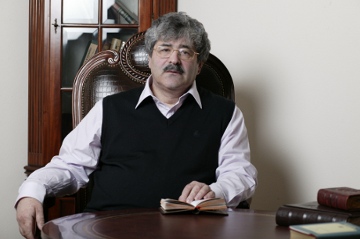
Civil society is maturing, not in the process of being born. Especially since it is not being born suddenly in Bolotnaya square or Revolutionary square...
Recently, I was surprised to have read and heard of people, intelligent, and familiar with history, that the street can be the midwife of civil society. It comes from conscientious and long-entrenched misconceptions in Russian society. For the intelligent - and now not only for them – the environment of civil society has become a commonplace idea, whose main mission is to conduct an impartial dialogue with the government.
For some - the more Fronde there is, the greater the citizenship. In the minds of the politicized the space between society and government, is the main, if not the only field of activity for civil society. Is this true?
In fact, civil society is not "vertical" but purely "horizontal". The very first exposures to the term "civil society" indicate this clearly. Here are some of them: civil society is, above all, a "community of citizens", "a collection of non-political and non-politically related citizens in society, and the”diversity is not mediated by the state of relations of the individuals", but the "scope of their self-organization and autonomy” ...
Hobbes and Hegel made an important contribution to the expansion of the concept of civil society. The first saw it overcome the primitive "state of nature of war of all against everyone."
The second saw the ability to benefit ourselves and our neighbors by our own labor. Only Marx, commenting on the history of the Paris Commune, somehow saw in a civil society, the ability to rebel against the government machine.
Where civil society is not developed, there is the temptation to overload its destiny, taking a part for the whole. For example, in considering the matter of law enforcement, notwithstanding public control over bureaucracy, this function is essential to civil society.
There are also the examples of a more "niche" approach where "civil society is a sphere of the self-manifestation of free citizens on the Internet."
There is even an application in regard to social priorities. The Chairman of the Board of Directors of JSCB "Vyatka-Bank" Gregory Guselnikov wrote in the newspaper "Vedomosti" (12.15.11.): "Our country really needs owners, not owners who are in charge, but best of all owners of their own business - small and medium-sized, private, and family, village and township. From them stems civil society ...”
Undoubtedly, the "responsible owner" is an important feature of civil society, but others may say that teachers, doctors, engineers and scientists are the core of civil society, rather than the mediocre businessman. Actually to set such priorities is meaningless for a simple reason - civil society excludes them in principle, it can only be monogamous, one at a time.
However, the famous entrepreneur instinctively understands that a narrow social base of civil society is not in the interest of the majority of society. "How far do responsible citizens exercise their rights of property ownership, it's easy to see from their yards and porches," says Guselnikov.
In this passage, it is worth taking pause. Without calling himself to the task, the author, in fact, gives a true and comprehensive definition of civil society as a society of responsible citizens. At the same time he points to the simplest things, lying literally on our doorstep.
You can walk with placards in protest; tolerate filth, rampant drug use and swearing in the streets, with the state of orphanages and hostels. You can close your eyes to the poverty of your neighbor, to neglect, to indifference, and to the extortion that hurts those on all sides today, and not necessarily in every case, is the main offender actually power.
Civil society offers its shoulder to its members, where the state is powerless to act. Otherwise, there is a glaring contradiction: to demand, on the one hand, independence and freedom from the state and at the same time admit a complete failure to fill the vacuum created. In the 1990s, we felt this in full.
That is why the claim that, having a rally at Bolotnaya Square, shows that "Russian citizens ... have proven that they are mature and responsible", then the observer can only be immature himself. Besides, it would be a faux pas, in fact, to deprive other citizens of Russia of a sense of citizenship.
But because this is so familiar, the best vanguard of which, of course, is revealed in an awakened "consciousness" of the masses. This is true, but boring.<!--EndFragment-->
read more in our Telegram-channel https://t.me/The_International_Affairs

 22:26 22.12.2011 •
22:26 22.12.2011 •






















